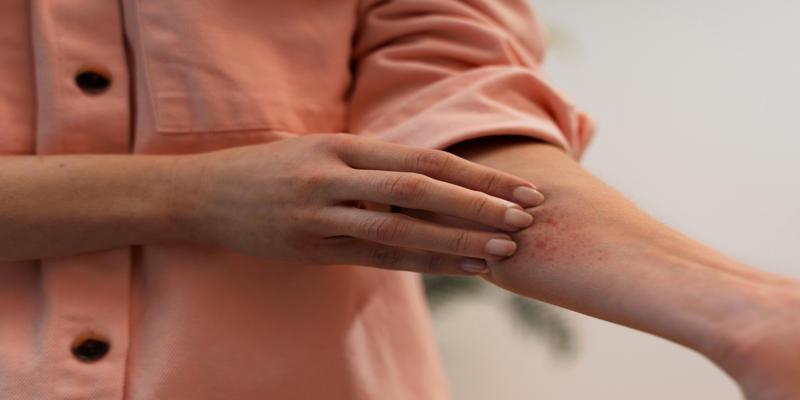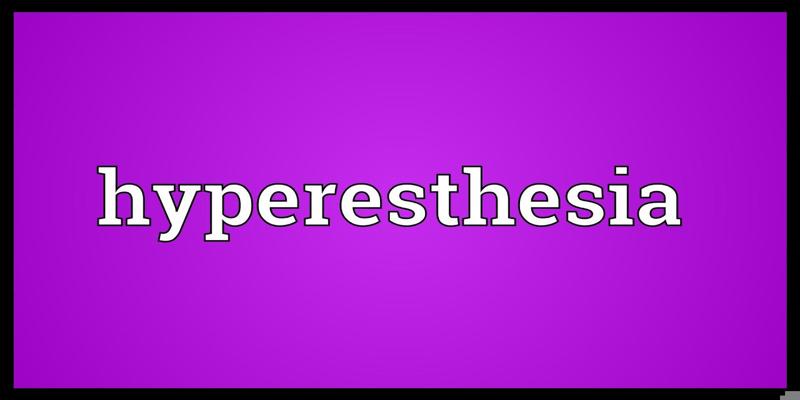There is no reason to freak out if you get extra sensitive; it is less scary than its name. Just get ready to become an expert in this interesting sensory phenomenon. In this article, we delve deep into the world of high sensitivity to unravel the mystery of hyperesthesia.
What is Hyperesthesia?

Not being numb skulls but sensational overdrive- that would be what hyperesthesia would feel like. An exciting condition makes people think they have above-average sensitivity to sensory stimuli. That only means your body's reactions to touch, sound, light, and even smell get super-magnified.
Understanding the Basics
It has nothing to do with keen senses but has everything to do with an overdrive nervous system, making normal sensations intense or painful. Just imagine that the soft, gentle brush of a feather across the skin may give the feeling of sandpaper, or the whisper sounds like a scream- hyperesthesia in action.
Types of Hyperesthesia
There is not just one flavor of hyperesthesia. You might go through:
- Tactile hyperesthesia: Increased sensitivity to touch
- Auditory hyperesthesia: Sensitivity to sounds
- Light hypersensitivity: High susceptibility to light
- Olfactory hyperesthesia: An increased sense of smell
Causes and Triggers
What could cause this roller coaster of sensations? Causes are all over the board: sometimes neurological, such as conditions involving migraines and fibromyalgia; other times, it's a side effect of medication or anxiety symptoms. Often, it is idiopathic, making this condition even more intriguing.
Symptoms of Hyperesthesia
It would be overwhelming if their senses were turned to eleven notches, and even the most mundane stimuli felt like a personal attack on the body. Now, let's learn about some general symptoms that one might encounter:
Heightened Sensory Perception
You may feel that ordinary sensations have become unbearably intense: The light is too bright, the noises are too loud, and the textures too striking. Your body is a radio with a high-volume control, so everything coming in is magnified.
Skin Sensitivity
Your skin can become super sensitive to touch. It may be so bad that even light contact, such as the feel of clothes or a breeze touching your skin, will cause discomfort or hurt. This sensitivity to touch can make every simple act cumbersome.
Sensory Overload
You might also feel hyper-aroused senses, and youre more likely to experience sensory overload. A loud, fantastic noise, pushy or flashing bright lights could overwhelm you and make you anxious or want to move to a quieter location.
Pain and Discomfort
Hyperesthesia is more than sensitivity; it may be associated with actual physical distress. One may experience burning sensations, tingling, or sharp pains from stimuli that would not usually cause such reactions.
Causes and Risk Factors

Have you ever wondered why some people can have hyperesthesia? There are a variety of potential reasons it may be hypersensitive, although its exact cause(s) remains undetermined. What are the possible causes for this intriguing condition?
Neurological Connections
These nerves can also be overactive and oversensitive. In most people, this heightened state is a response to normal stimuli.
Underlying Health Conditions
Hyperesthesia does not necessarily have to be a problem on its own. It can be part of various health conditions, which include:
- Fibromyalgia
- Multiple sclerosis
- Migraines
- Anxiety disorders
Environmental Factors
Your environment may also be involved. Sometimes, specific chemicals, medications, and chronic stress raise sensitivity. It is as if the volume of your body's alarm system has been turned up to eleven; you may develop an awareness of every tiny sensation.
Genetic Predisposition
While inconclusive, some researchers believe hyperesthesia might have a genetic component. If you have a family history of sensory processing disorders or related conditions, you might be at a higher risk of developing hyperesthesia yourself.
Diagnosis and Treatment
Recognizing Hyperesthesia
Those suffering from hyperesthesia seek medical attention if they suspect they have it. This statement above states that your doctor will physically examine you and ask you for an explanation of symptoms, etc. The doctor may delve further into your medical history and recent environmental or lifestyle changes that may have triggered increased sensory response.
Diagnostic Approaches
Diagnosis can be tricky because there is no single test that defines hyperesthesia. Your doctor might use one or more of the following:
- Neurological tests are conducted to assess the functioning of nerves
- Tests for sensation, which record your response to types of stimuli
- Blood tests to exclude underlying disorders
- Imaging studies to look for nervous system abnormalities
Treatment Options
Treatment for hyperesthesia consists of treating the symptom if one exists and the cause of any such exists. Your doctor may recommend the following:
- Desensitization of the nerves or pain medications that can be given.
- You can help avoid triggers by changing your lifestyle.
- Other relaxation techniques, such as cognitive behavioral therapy
Living with Hyperesthesia
Living with hyperesthesia can be a unique and challenging experience. Sometimes, your heightened sensory perception may feel like a blessing; other times, it will feel like a curse. Let's take a practical look at ways to deal with daily life with this condition.
Managing Your Environment
Treatment for hyperesthesia consists of treating the symptom if one exists and the cause of any such exists. Your doctor may recommend the following:
- Desensitization of the nerves or pain medications that can be given.
- You can help avoid triggers by changing your lifestyle.
- Other relaxation techniques, such as cognitive behavioral therapy
Developing Coping Strategies
Learning to manage your heightened senses is vital to living comfortably with hyperesthesia. Consider trying:
- It brings you to focus and helps your mind to center.
- Deep breathing exercises when feeling overwhelmed.
- Gradual exposure therapy is the process of building a tolerance to certain stimuli.
Seeking Professional Support
Do not hesitate to get professional medical help. A neurologist or occupational therapist could offer treatment advice or other beneficial suggestions. Remember, youre not alone, and theres a lot of hope in keeping your disorder under control and playing life at full strength with hyperesthesia.
Conclusion
There you have it-explaining the nuts and bolts of hyperesthesia. Understanding what is happening may make a big difference whether you are experiencing this sensory sensitivity yourself or someone close to you. You are not alone. A lot of people out there are doing the same with amplified sensations. Always be bold and ask for help or speak with your doctor regarding methods for managing it. The good news is that one can learn to work with hyperesthesia rather than against it with the right tools and knowledge. One never knows maybe the upsides in supersensitive senses will surprise them.











